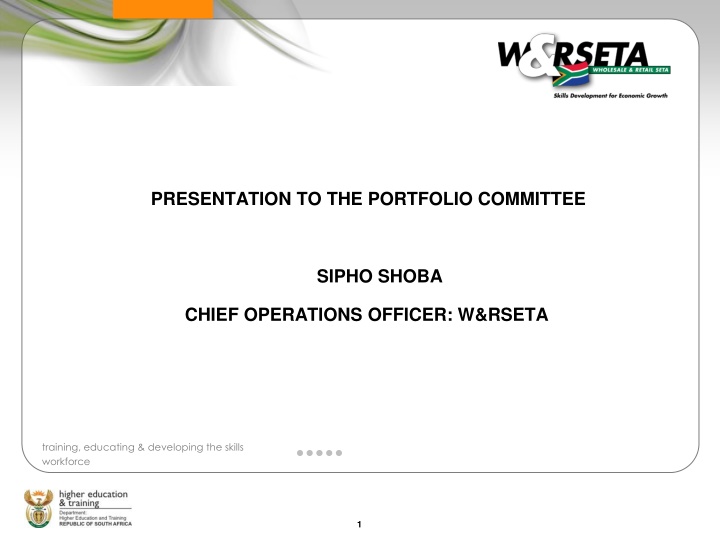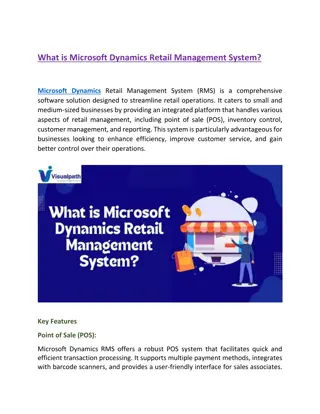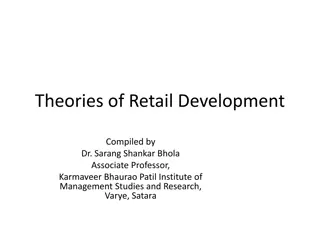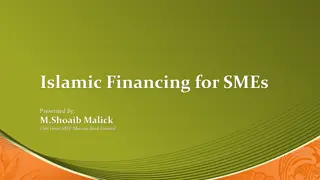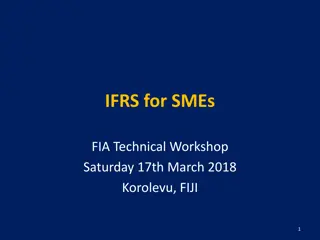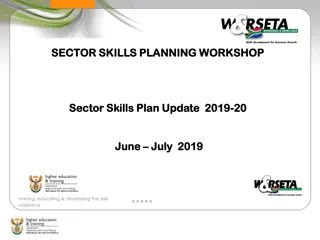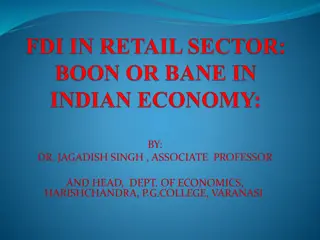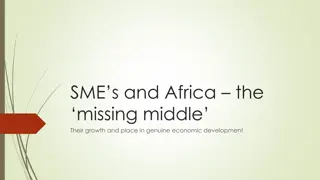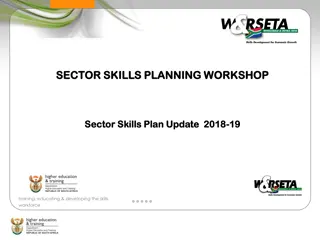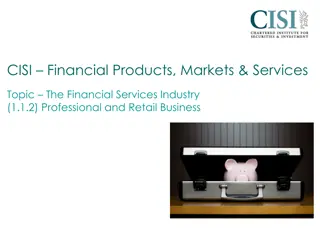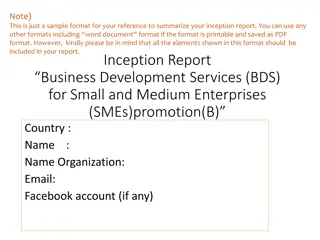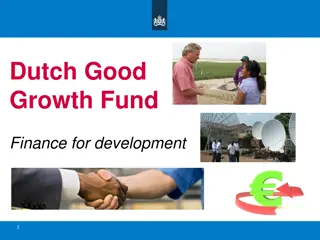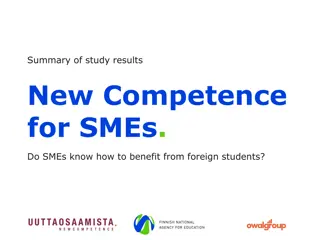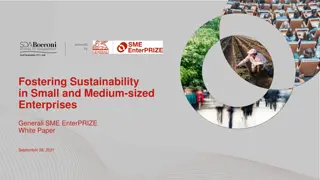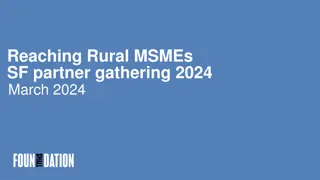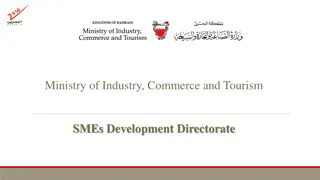Enhancing Skills Development and Support for SMEs in the Wholesale and Retail Sector
The presentation to the Portfolio Committee by Sipho Shoba, the Chief Operations Officer of W&RSETA, highlights the organization's mandate, vision, and mission to develop a skilled workforce in the Wholesale and Retail sector in South Africa. It discusses the situational analysis of the sector, emphasizing the challenges faced by SMMEs and the role W&RSETA plays in supporting them through skills development. Key achievements in supporting SMEs through skills development and support are outlined, showcasing the impact made in training, educating, and developing the skills workforce.
Download Presentation

Please find below an Image/Link to download the presentation.
The content on the website is provided AS IS for your information and personal use only. It may not be sold, licensed, or shared on other websites without obtaining consent from the author.If you encounter any issues during the download, it is possible that the publisher has removed the file from their server.
You are allowed to download the files provided on this website for personal or commercial use, subject to the condition that they are used lawfully. All files are the property of their respective owners.
The content on the website is provided AS IS for your information and personal use only. It may not be sold, licensed, or shared on other websites without obtaining consent from the author.
E N D
Presentation Transcript
PRESENTATION TO THE PORTFOLIO COMMITTEE SIPHO SHOBA CHIEF OPERATIONS OFFICER: W&RSETA training, educating & developing the skills workforce 1
W&RSETA MANDATE, VISION AND MISSION Mandate: The Wholesale and Retail SETA (W&RSETA) is a schedule 3A public entity and derives its mandate from the Skills Development Act No. 97 of 1998 (as amended). The SETA is responsible for supporting skills development in the wholesale and retail sector in South Africa, through the disbursement of grants to facilitate the implementation of learning Programmes and monitoring of education and training (as outlined in the Act), in accompanying regulations and the National Skills Development Plan. Vision: To be the leader in skills development in the country Mission: To develop a skilled, capable, competent, and professional workforce to transform the Wholesale and Retail sector. training, educating & developing the skills workforce 2
W&RSECTOR SITUATIONAL ANALYSIS The W&R sector in South Africa is made up of many SMMEs in need of support and development. With SMMEs accounting for approximately 90% of the W&R sector, sustainability becomes key. There are different factors that impacts negatively on sustainability of SMME s at different stages of survival. Weak sustainability of SMMEs in South Africa has mostly been blamed on macro-economic factors such as the economic uncertainty, extensive red tape, high costs of credit, high interest rates, high inflation rates, rapid changes in governmental legislation and volatile exchange rates. Micro-economic factors such as bad pricing strategies, high overhead costs, incompetent human resources, lack of infrastructure, limited access to financing opportunities and poor cash flow management have also been stated as reasons SMMEs fail (Wholesale and Retail Leadership Chair: Cape Peninsula University of Technology Cape Town, 2016). There is a role which the W&R SETA can play in supporting the SMMEs to address the macro and micro economic factors stated above, through skills development and support. The SMMEs and Entrepreneurship Strategy must appreciate the different events that the country suffered with greater impact on SMMEs, Entrepreneurs and Informal Traders such as the COVID-19 pandemic and the July 2021 riots and looting. Taking into consideration these events will ensure that meaningful solutions to support businesses within the sector are formulated. training, educating & developing the skills workforce 3
KEY ACHIEVEMENT BY W&RSETA FOR SMEs THROUGH SKILLS DEVELOPMENT AND SUPPORTS FY 2019/20 TO 21/22 Indicator/Intervention 2019/20 2020/21 2021/22 Number of Small and Medium Enterprises supported to participate in W&RSETA skills development interventions annually 3 608 2446 2508 Budget/Spent @R18 000 per SME for Training & Business Support R64,9m R23,2m R23,8m Number of informal traders and micro enterprises participating in W&RSETA capacitation workshops annually 1 600 2426 2401 Budget/Spent@ 8 000 per Trader/Hawker for Training & Support R12,8m R19,4m R19,2m Number of people trained on Entrepreneurship Development Programmes to enable them to start their own businesses or grow their existing businesses None 303 477 R6,36m R10 m training, educating & developing the skills workforce 4
W&RSETA CHALLENGES IN IMPLEMENTING SKILLS DEVELOPMENT AND SUPPORT TO THE SME s The W&RSETA provides support to SMME s, levy paying and exempt, in different forms and it is crucial that the impact of the support is tracked. Currently, there is no clear impact analysis that provides a picture on how the SMME s support yields successful and sustainable SMMEs. As part of support provided to informal traders, the SETA provides Skills Development Vouchers, which assist Informal Traders with support to grow their businesses. At this stage, there is no monitoring mechanism that tracks if the Informal Traders uses the vouchers for the purpose that they are intended for, and also to avoid Informal Traders who benefit from the voucher system in different provinces. This requires an establishment of a monitoring and evaluation mechanism that will ensure that there is evaluation of the business improvement resulting from the W&RSETA s support, as well as assessing the impact of the voucher system. training, educating & developing the skills workforce 5
5 PRIOTIES OF THE SME STRATEGY TO DEAL WITH CHALLENGES WE ARE FACED Priority 1: Continuously support SMMEs to improve current skills development and training interventions provided by W&RSETA Priority 2: Improve coordination and collaboration between the W&RSETA, Government agencies and other SETAs Priority 3: Focus the W&R SETA s SMMEs and cooperative programme on rural based enterprises Priority 4: Improve access to the W&R SETA s SMME and cooperative support information Priority 5: Provide Career Guidance and pathing support for SMMEs training, educating & developing the skills workforce 6
THANK YOU! training, educating & developing the skills workforce 7
